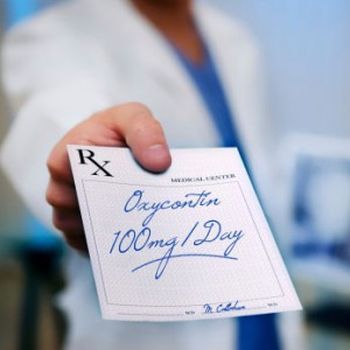
Publisher:
Bonnie King
CONTACT:
Newsroom@Salem-news.com
Advertising:
Adsales@Salem-news.com

~Truth~
~Justice~
~Peace~
TJP
Jun-23-2013 13:31

 TweetFollow @OregonNews
TweetFollow @OregonNews
Top 'Experts' Keep Pushing OxyContin and Confusing Public About 'Addiction'
Marianne Skolek Salem-News.comPart 2 - "The Untouchables" - Lynn R. Webster, MD, Scott M. Fishman, MD and Lisa Robin, Federation of State Medical Boards -- what makes them think they are "untouchable"?
 Courtesy: one80center.com |
(MYRTLE BEACH, SC) - As an example of these individuals perhaps feeling untouchable is an experience I had last week -- that plays out every day in all 50 states as well as Canada. In talking with a 75 year old woman, she told me that her physician had prescribed OxyContin for her back pain a few weeks ago - 10 milligrams twice a day. In a couple of weeks, he increased her dosage to 30 milligrams twice a day. I asked her if her doctor told her that OxyContin was synthetic heroin and highly addictive. He never mentioned either fact to her - he just told her that OxyContin was sold on the streets so for her to be careful where she kept the drug. I will be seeing this woman again in a couple of weeks and I'm confident she will be taking a higher dose of OxyContin and her journey to horrific addiction and withdrawal at 75 years old will result - directly attributable to the criminal marketing of OxyContin as well as other dangerous opioids.
Still think you're untouchable Drs. Webster, Fishman and Ms. Robin? I wouldn't be so confident -- the above scenario is only one of hundreds of thousands by your downplaying the word "addiction" for years to the medical profession.
From an April 2013 video, Dr. Webster talks to the medical profession about "patients displaying aberrant behaviors and should clinicians assume abuse of their opioid?" Below is a link to Webster's video as well as a written transcript of what he says. Keep in mind this video was made only two months ago -- after the Drug Enforcement Agency (DEA) announced they were investigating deaths at Dr. Webster's pain clinic in Salt Lake City, Utah.
Written transcript of video:
Lynn R. Webster, MD, FACPM, FASAM
Medical Director
CRILifetree
Co-Founder, LifeSource
Salt Lake City, Utah
When a patient displays aberrant behaviors, should clinicians assume they are abusing their opioid?
- "Hi. I am Lynn Webster, medical director of CRILifetree Clinical Research in Salt Lake City. Aberrant behaviors are just an indication that somebody has not followed the prescription the way that they have been instructed, but it does not mean that the individual has an addiction or that they should not necessarily receive their pain medications. However, it does mean that when we see an aberrant behavior, we need to find out why. We have to investigate why that aberrant behavior has appeared, maybe it is somebody who is not following the instructions because they are self-medicating; their pain is not adequately treated. On the other hand, they may be trying to use the medicine to treat a comorbid medical health disorder, and that would be problematic. So the key here is aberrant behaviors need to be investigated. You need to document in your medical record why you believe that aberrant behavior occurred and what you are planning to do about it."
©2013 MediCom Worldwide, Inc.
This does not mean that the individual has an "addiction", Dr. Webster. This is beyond irresponsible on your part -- it is your concept of being untouchable by the DEA and the U.S. Senate. And it doesn't end there.
In the June 2013 "Pain Medicine News", Webster further displayed his narcissistic behavior and his being untouchable by having the following eight Principles for Safer Opioid Prescribing published:
| ||
So Dr. Webster any reason why you avoid using the word "addiction" in your eight prescribing principles for providers? You can't possibly think that the DEA or the U.S. Senate investigating you doesn't notice your avoidance of the word -- can you?
Now moving on to Scott M. Fishman, MD on the US Senate radar and potentially the DEA's, we have the following information shown on the Federation of State Medical Boards (FSMB) website. The FSMB is the voice to the medical boards throughout the U.S. on safely prescribing opioids. This is how they go about it compliments of Dr. Fishman:
The Federation of State Medical Boards (FSMB)
- Foundation has published an electronic version of its book, “Responsible Opioid Prescribing™: A Clinician’s Guide,” available for Kindles, Nooks, iPads and other popular platforms.
The book, written by pain medicine specialist Scott M. Fishman, MD, offers clinicians effective strategies for reducing the risk of addiction, abuse and diversion of opioids that they prescribe for their patients in pain. It is part of the FSMB’s ongoing initiative to address the rise of opioid abuse and related deaths in the United States by better educating physicians and other clinicians about their risks and proper use. Dr. Fishman is a leading pain medicine clinician, researcher, teacher, lecturer and writer, serving as Chief of the Division of Pain Medicine and professor of Anesthesiology at the University of California, Davis.
The Foundation has created an easy-order web page for the eBook, which can be accessed at www.fsmb.org/book. The electronic version of the book, produced by publisher Waterford Life Sciences, is available on ePub, Kindle Apple iBooks platforms and can be read on devices ranging from computers and tablets to iPhones.
The book is priced at $16.95, and is certified for up to 7.25 AMA PRA Category 1 Credits™ by the University of Nebraska Medical Center. The revised and expanded 2nd edition of “Responsible Opioid Prescribing” offers new material — including research on opioid prescribing and risk management that was not available when the first edition was published in 2007 — along with updated recommendations for prescribers.
The "revised and expanded 2nd edition" of Dr. Fishman's book offers new material from 2007? I don't think so - in 2007 the book avoided the word "addiction" now the rise in opioid addictions and deaths to over 400% in a decade has made the fire a little too hot for Fishman and the FSMB. Therefore, "new material" was offered by Fishman although it was far from new material to him as well as the FSMB in 2007. And the medical profession bought what Fishman and the FSMB were selling - hook, line and sinker in the form of his well promoted book.
The FSMB pushed Fishman's book to physicians in all 50 states compliments of their website and via Lisa Robin, Chief Advocacy Officer.
From the FSMB website:
- Robin successfully worked with the Wyoming, Delaware and South Carolina state medical boards to adopt pain policies and will continue efforts to reach out to additional states to adopt or update their pain policies. (See copy of Dr. Fishman's book advertised on the FSMB website shown below).
Robin said:
- "If the medical boards will take affirmative actions or conduct policymaking in the area of pain management, having a policy framework that will support good practice is important."
- "Since learning about communications and media strategies at the training, Robin has learned different tricks to dealing with the media and interviews."
I bet the "tricks" in dealing with the media and interviews were extremely helpful in an increase of 400% in opioid addictions and deaths in the past decade. After all, the medical profession bought into the "tricks" and didn't concern themselves with addiction as a result of prescribing opioids. I'll remember to tell the 75 year old woman with back pain the definition of "addiction" -- as she experiences it first hand. Some cruel "trick" FSMB -- still think you are untouchable?
| |||||||||||||||||||||
 | |||||||||||||||||||||
| |||||||||||||||||||||
| Home | Privacy Policy | A-Z Index © 2013 Federation of State Medical Boards | |||||||||||||||||||||
Marianne Skolek twitter.com/MarianneSkolek
Investigative Reporter for Salem-News.com on drug epidemic
www.salem-news.com/by_author.php?reporter=Marianne%
www.youtube.com/watch?
judiciary.senate.gov/hearings/testimony.cfm?id=e655f9e2809e5476862f735da12c8394&wit_id=e655f9e2809e5476862f735da12c8394-2-1
www.vawd.uscourts.gov/PurdueFrederickCo/default.asp
www.oxydeaths.com908-285-1232

Salem-News.com Investigative Reporter Marianne Skolek, is an Activist for Victims of OxyContin and Purdue Pharma throughout the United States and Canada. In July 2007, she testified against Purdue Pharma in Federal Court in Virginia at the sentencing of their three CEO's - Michael Friedman, Howard Udell and Paul Goldenheim - who pleaded guilty to charges of marketing OxyContin as less likely to be addictive or abused to physicians and patients. She also testified against Purdue Pharma at a Judiciary Hearing of the U.S. Senate in July 2007. Marianne works with government agencies and private attorneys in having a voice for her daughter Jill, who died in 2002 after being prescribed OxyContin, as well as the voice for scores of victims of OxyContin. She has been involved in her work for the past 8-1/2 years and is currently working on a book that exposes Purdue Pharma for their continued criminal marketing of OxyContin.
Marianne is a nurse having graduated in 1991 as president of her graduating class. She also has a Paralegal certification. Marianne served on a Community Service Board for the Courier News, a Gannet newspaper in NJ writing articles predominantly regarding AIDS patients and their emotional issues. She was awarded a Community Service Award in 1993 by the Hunterdon County, NJ HIV/AIDS Task Force in recognition of and appreciation for the donated time, energy and love in facilitating a Support Group for persons with HIV/AIDS.
 |
 |
 |
Articles for June 22, 2013 | Articles for June 23, 2013 | Articles for June 24, 2013
Quick Links
DINING
Willamette UniversityGoudy Commons Cafe
Dine on the Queen
Willamette Queen Sternwheeler
MUST SEE SALEM
Oregon Capitol ToursCapitol History Gateway
Willamette River Ride
Willamette Queen Sternwheeler
Historic Home Tours:
Deepwood Museum
The Bush House
Gaiety Hollow Garden
AUCTIONS - APPRAISALS
Auction Masters & AppraisalsCONSTRUCTION SERVICES
Roofing and ContractingSheridan, Ore.
ONLINE SHOPPING
Special Occasion DressesAdvertise with Salem-News
Contact:AdSales@Salem-News.com

googlec507860f6901db00.html



Terms of Service | Privacy Policy


All comments and messages are approved by people and self promotional links or unacceptable comments are denied.
Patrick June 26, 2013 11:22 am (Pacific time)
This article is TERRIBLY biased, and defamatory. I really have no idea why its in a publication at all...this is more like a blog.
Let's see, maybe because people are dying from drug addiction and these profiteer physicians are getting away with Murder, is that a good answer? LOL Oh and the Huff Post is a blog. The terminology doesn't mean too much these days.
[Return to Top]©2025 Salem-News.com. All opinions expressed in this article are those of the author and do not necessarily reflect those of Salem-News.com.